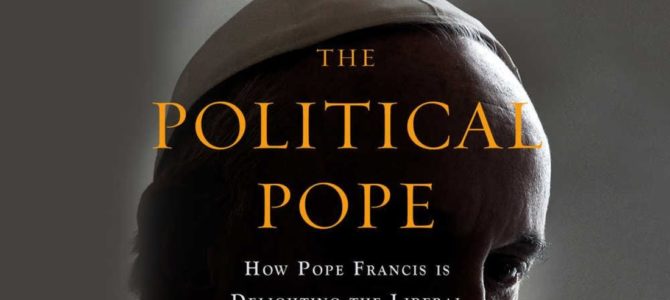
The Left’s long march to the papacy is the bitter core of George Neumayr’s J’accuse. In the spirit of Émile Zola’s open letter in defense of Alfred Dreyfus, The Political Pope: How Pope Francis Is Delighting the Liberal Left and Abandoning Conservatives is written “with the revulsion of an honest man” against a travesty in which he refuses to participate. Neumayr defends the church as he knows it against the scandal of Pope Francis’ appetite for recognition by Western liberal elites and the power that attends it.
Admittedly ignorant of economics, Jorge Bergoglio brings to the Chair of Peter a compensatory animus toward Western affluence and achievements. This is no mere parochial matter. The danger he represents to the culture and civic order of open societies affects the entire fabric of Western nations. It ought not be passed over in silence by non-Catholics. For that reason Neumayr quotes The Federalist’s Robert Tracinski:
I am not a Catholic nor even a Christian . . . So what does it matter to us whether this pope is surrendering to the left? Historically, it does matter, because in the 20th century the Church helped change the course of history, vastly for the better, by offering ideological and material resistance to Communism. It mattered that there was a large institution with deep historical roots that was independent from the socialist state and politically correct orthodoxy, driven by a different set of values. And it is discomforting to think what might happen if that is no longer true.
Jorge Bergolio’s pontificate, careening leftward on all fronts from the geo-political to the canonical, merits Neumayr’s undisguised disdain:
At times the pope almost sounds like a parody of a 1960s-style pacifist . . . Just as the pope casually equates capitalism with greed, so he equates weaponry with blind violence. He has called the arms trade an ‘industry of death’ and said that it is ‘furthering a cycle of hate, fratricide, violence.’ That weapons protect innocent people from the violent rarely figures into his analysis.
The day after an Islamic terrorist fired upon hundred of people at a homosexual nightclub in Orlando, Florida . . . the pope condemned the arms trade. He preferred to engage that subject rather than the spread of Islam.
Neumayr drafts a scathing indictment of the unbridled Promethean fantasies of a fallible man promoted by Vatican press agentry as the light of the world. The Vatican announcement for this April’s papal trip to Egypt showcased Francis as “the Pope of Peace.”
Previously Francis offered himself as pope of the world, addressing his 2015 encyclical “Laudato Sí” to all peoples “on the planet.” His bien pensant conceits are a grant to the global Left and a plum for our own liberal Democrats:
Pope Francis has called on the bishops to incorporate leftist groups into their chanceries in the form of ‘social justice’ offices. Addressing socialists at a meeting of’“popular movements’ in 2015, he assured them that the bishops stand ready to help them: ‘I am pleased to see the Church opening her doors to all of you, accompanying you, and establishing in each diocese, in every justice and peace commission, a genuine, ongoing, and serious cooperation with popular movements. . . .’
Had [Saul] Alinsky lived to see the papacy of Francis, he would have laughed at the ease with which his devious work has been advanced in the Church.
The Political Pope inventories press reports on Francis’ enthusiasms, from opposition to life imprisonment (“Life imprisonment is a hidden death penalty”) to embrace of Palestinian statehood and doctrinaire multiculturalism. In a 2016 interview with La Croix, Francis explained his reluctance to acknowledge European civilization’s roots in Christianity:
We need to speak of roots in the plural because there are so many. In this sense, when I hear talk of the Christian roots of Europe, I sometimes dread the tone, which can seem triumphalist or even vengeful. It then takes on colonialist overtones.
In Francis’ mind, the Christian West bears the mark of Cain. It can redeem itself by accommodating unchecked millions of members of radically different non-Western, even anti-Western, cultures. Neumayr cites the comments of Italian bishop Andrea Gemma: “I would expect a more firm defense of Christians. I would like a pope more energetic in defense of our principles and our faith.”
Neumayr is an ardent polemicist. His hostility is invigorating to Catholics who believe Pope Francis has earned it in spades. Shared antagonism is stimulating; it gets the blood up. Yet precisely because I share Neumayr’s distaste, I am disappointed. This is not the book I expected. I had looked forward to a forceful case that would be persuasive to the legions of well-intentioned people, Catholic and non-Catholic, beguiled by a crafted papal image and deferential to office. Instead, the text exchanges sustained inquiry for a collection of brief, punchy segments that rely on polemics to do the work of analysis, and are too often directed at the choir.
The quality that makes Neumayr a fine columnist—the capacity to react clearly, swiftly, and aggressively to the news cycle—works against the book. Freed from the constraints of periodic journalism, book-length treatment provides room for developed reflection. It permits deeper scrutiny of evidence, attention to nuances, and a more expansive view of the past—the longue durée, not just the 1950s. Neumayr, however, keeps to the conventions of an op-ed piece.
Captions are illustrative: “Bernie Sanders Goes to the Vatican,” “Jesuitical Situation Ethics,” “The Pope’s Praise of Atheists,” “Freezing Out Conservatives, Promoting Liberals,” “Supporting Liberal Nuns,” and the like. Each topical section arrives at the same point: Francis is the pope from hell.
But pinning the devil’s tail on Francis confuses effects with causes. It is consoling to see Francis as a villain rather than the discernible symptom of institutional disarray. Thomas Sowell made a crucial distinction: “The Left has its pope. . . Pope Francis is part of a larger trend of the rise of the political left among Catholic intellectuals. He is, in a sense, the culmination of that trend.” Neumayr quotes Sowell but does not pursue his point. More accurately, he follows it down a crooked path.
Among a portion of Catholic traditionalists, the anti-Masonic movement of the nineteenth century still lives. It is a short walk from one bogey to the next. The Political Pope opens on a conspiratorial note: “The Soviets had long eyed the Catholic Church for infiltration.” This is not to say conspiracy theories are wrong. But the absolutist temper of Neumayr’s assent to them, based on a scant few articles in the Catholic press, sends up an antenna.
The tragic complexities of the slide of Christian thought into neo-Marxist dogma owe themselves to more than the commie cardinals and seminarian operatives of Bella Dodd’s 1953 testimony before the House UnAmerican Activities Committee. Equal prudence is needed to solidify claims by the dubious Ion Mihai Pacepa, one-time Stalinist spy chief in Romania, that the KGB spawned liberation theology.
Vexed, Neumayr permits himself to forget that Francis is hardly “The First Radical Green Pope.” That title, in lower case, belongs to Pope Benedict. It was Benedict who injected morality into environmental debates, making environmental awareness crucial to his tenure, In 2009 he chided world leaders for inadequate climate change proposals at the United Nations conference in Copenhagen that year. He envisioned Vatican City a carbon neutral state. He ordered 2,400 solar panels installed on the roof of a new concert hall, and authorized the Vatican Bank to purchase carbon-offsets by funding a dicey scheme to create a forest in Hungary. Benedict encouraged “environmental stewardship” to be introduced in seminary curricula.
Prior to Benedict, in a speech on the World Day of Peace, 1990, John Paul II urged Catholics to honor the natural world as one of God’s creations worth protecting. Eco-guilt did not originate with Francis.
Neumayr does not advance his case against Francis with jabs at modern scriptural scholarship, a literalist attachment to Adam and Eve as actual persons, or by stepping into the quicksand of intelligent design versus Darwinian theories of evolution. Unwisely, he faults Francis for lifting sanctions against Argentine biblical scholar Ariel Álvarez Valdés “who denies the historicity of Adam and Eve.” If that had been the crux of Vatican censure against Valdés, Francis did the right thing. And Neumayr narrowed his audience with an undiscerning, unnecessary complaint.
If only Neumayr had stepped back a bit from his own outrage to insure that key aspects of his bill of particulars were convincing to those outside the circle of his certitudes. If he had kept his eye on politics and left heresy-spotting to others, this would have been the book I had waited for.









